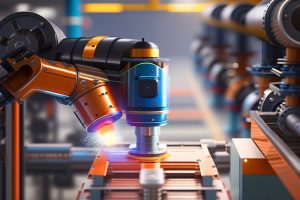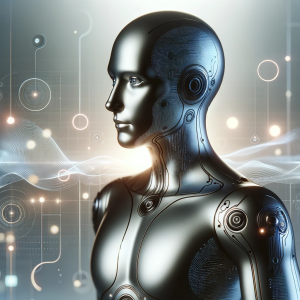In recent years, AI as a job enhancer has emerged as a transformative force, reshaping industries and revolutionizing the way we work. Far from being the feared job-killer, AI is proving to be a job enhancer, creating new roles and empowering employees to focus on higher-value tasks. In this article, we will explore the various ways in which AI is enhancing current jobs, with specific examples of how it is streamlining processes and unlocking new opportunities for workers across different sectors.
AI in Data Analysis and Insights
AI’s prowess in data analysis has opened up an array of possibilities for enhancing existing jobs. Data analysts, for instance, can now leverage AI-powered tools to process vast volumes of data quickly and accurately. This allows them to spend more time interpreting insights and providing data-driven recommendations, rather than being bogged down by manual data processing.
In finance, AI-driven algorithms can analyze financial data and market trends at unparalleled speeds, enabling financial analysts to make informed investment decisions swiftly. The power of AI in data analysis has also transformed market research. Market researchers now benefit from AI technologies that analyze consumer behavior and preferences in real-time. By automating the data collection and analysis process, AI empowers market researchers to extract deeper insights, leading to more effective strategies and campaigns.
AI’s impact in data analysis isn’t limited to the financial and market research sectors alone. In the realm of sports, AI is revolutionizing the way teams strategize and analyze players’ performance. Coaches and analysts can use AI-driven tools to study game footage and track player statistics. This provides valuable insights into opponents’ tactics and helps optimize players’ training routines, ultimately enhancing team performance.
AI in Customer Service
AI-powered chatbots have become increasingly popular in customer service, and for good reason. These virtual assistants are capable of handling routine queries, resolving issues, and even processing transactions autonomously. By taking over repetitive tasks, chatbots free up customer service representatives to focus on complex inquiries and building stronger customer relationships.
In addition to chatbots, AI-driven sentiment analysis tools have revolutionized how companies gauge customer feedback. Customer service teams can now analyze vast amounts of customer data to understand sentiments and trends better. Armed with these insights, they can fine-tune their approach, resulting in enhanced customer satisfaction.
The application of AI in customer service goes beyond just chatbots and sentiment analysis. AI is also being used to enhance customer support experiences through voice assistants. Smart speakers and voice-controlled devices have become a popular way for customers to interact with companies. AI-powered voice assistants, like Amazon’s Alexa and Google Assistant, can provide personalized responses to queries, track customer preferences, and even facilitate online purchases.
AI in Healthcare
In the healthcare sector, AI is making significant strides in improving patient care and enhancing medical professionals’ roles. AI-driven diagnostic tools are assisting physicians in detecting diseases more accurately and at an earlier stage. This early detection can be life-changing for patients, as it increases the chances of successful treatment.
Moreover, AI-powered robotic systems are aiding surgeons in performing intricate procedures with unmatched precision. By partnering with AI, surgeons can achieve better outcomes, minimize complications, and reduce recovery times, ultimately enhancing the quality of care provided to patients.
Beyond patient care, AI is also transforming drug discovery and development. AI algorithms can analyze vast amounts of genomic and chemical data, helping researchers identify potential drug candidates more efficiently. This not only expedites the drug development process but also brings new hope for patients with rare diseases and conditions.
AI is also playing a crucial role in medical research and genomics. AI-driven algorithms can sift through massive genomic datasets, identifying genetic markers associated with diseases. This enables researchers to better understand disease mechanisms, develop targeted therapies, and ultimately improve patient outcomes.
AI in Creativity and Content Creation
While some may argue that AI poses a threat to creative professions, it is, in fact, opening up new avenues for creative expression. For example, in the field of design, AI-generated artwork is becoming a prominent trend. Artists can collaborate with AI tools to create stunning visuals, saving time on repetitive tasks and unleashing their creativity on more intricate aspects of their work.
Moreover, in content creation, AI-powered writing assistants have become valuable assets. Writers can use these tools to generate topic ideas, optimize content for SEO, and even draft sections of articles. By automating these tasks, writers can allocate more time to crafting engaging narratives and conducting in-depth research.
In the entertainment industry, AI is revolutionizing the way films and music are produced. AI algorithms can analyze vast amounts of data on audience preferences and trends, helping filmmakers and musicians create content that resonates with their target audiences. This data-driven approach to creativity not only enhances the quality of content but also increases its commercial success.
In the world of marketing and advertising, AI is playing a crucial role in content creation and optimization. AI-powered tools can analyze consumer data and preferences, allowing marketers to tailor advertisements that are more likely to resonate with their target audiences. This level of personalization significantly improves the effectiveness of marketing campaigns, leading to higher engagement and conversion rates.
AI in Education
AI is transforming the education landscape by personalizing learning experiences for students. Intelligent tutoring systems can assess individual learning styles and adapt teaching materials accordingly. This allows educators to cater to the unique needs of each student, fostering better understanding and retention of information.
Furthermore, AI-driven grading systems streamline the assessment process, enabling teachers to spend more time on mentoring and providing constructive feedback to students. With administrative tasks reduced, educators can focus on inspiring and nurturing the next generation of learners.
Beyond the classroom, AI-powered educational platforms are democratizing access to knowledge. Online courses and e-learning platforms leverage AI to analyze learners’ progress and preferences, tailoring the learning experience to suit individual needs. This accessibility to quality education benefits learners worldwide, regardless of their geographical location or socioeconomic background.
AI is also helping bridge the digital divide in education. In remote or underserved areas, where access to quality education is limited, AI-powered educational tools offer an opportunity for self-paced learning and skill development. These tools provide personalized learning paths, helping individuals acquire new skills and enhance their employability.
AI in Agriculture
The agriculture industry is also reaping the benefits of AI integration. AI-powered drones and sensors are revolutionizing farm management by providing real-time data on crop health, soil conditions, and weather patterns. Farmers can use this information to make data-driven decisions, optimize irrigation, and predict yields more accurately.
Additionally, AI-driven precision agriculture techniques help reduce resource wastage and increase productivity. By automating tasks like planting, harvesting, and pest control, AI enhances efficiency and empowers farmers to make better use of their time and resources.
Moreover, AI’s potential in agriculture extends to plant breeding. By analyzing genetic data, AI algorithms can identify desirable traits in crops and accelerate the development of new, more resilient varieties. This ensures food security in the face of climate change and growing global demand.
In livestock management, AI-powered systems can monitor the health and well-being of animals, detecting early signs of illness and stress. This proactive approach to animal husbandry not only improves animal welfare but also enhances overall farm productivity.
AI in Transportation
AI is rapidly reshaping the transportation industry, particularly with the rise of autonomous vehicles. Self-driving cars and trucks are poised to revolutionize logistics and transportation by improving safety and reducing delivery times. As AI technologies continue to advance, we can expect more efficient and eco-friendly transportation solutions to emerge.
Beyond autonomous vehicles, AI is enhancing public transportation systems. AI algorithms analyze commuter patterns and optimize public transport schedules, reducing waiting times and congestion. This not only improves the overall transportation experience but also promotes sustainable urban development.
AI is also transforming the logistics and supply chain sector. AI-driven algorithms can optimize shipping routes, warehouse management, and inventory control. This level of optimization leads to reduced transportation costs, faster order fulfillment, and more efficient supply chain operations.
AI in Manufacturing and Industry
The manufacturing sector has embraced AI to streamline production processes and enhance quality control. AI-powered robots and cobots (collaborative robots) work alongside human workers, taking on repetitive and physically demanding tasks. This collaboration boosts productivity and reduces the risk of workplace injuries.
In addition to manufacturing, AI is also transforming maintenance operations. Predictive maintenance, enabled by AI, uses sensor data to forecast equipment failures before they occur. This proactive approach to maintenance minimizes downtime and production disruptions, saving time and resources.
AI is also being used to optimize energy consumption in manufacturing facilities. AI-driven energy management systems can analyze data on energy usage patterns and make real-time adjustments to optimize energy efficiency. This not only reduces operating costs but also contributes to a more sustainable future.
AI in Human Resources
AI is revolutionizing the way companies manage their human resources. AI-powered tools can analyze resumes and job applications, shortlisting candidates with the most relevant skills and experience. This speeds up the recruitment process and ensures that companies hire the best-fit candidates for their positions.
Moreover, AI-driven chatbots are enhancing the employee experience by providing instant support for HR-related inquiries. Employees can get answers to their questions, access information on company policies, and even complete routine HR tasks without the need for human intervention.
AI is also being used in employee performance evaluations and talent management. AI-driven systems can analyze employee data and provide insights on individual performance, potential career paths, and training needs. This data-driven approach to talent management ensures that employees are placed in roles that align with their strengths and development goals.
AI in Retail
The retail industry is experiencing a significant transformation thanks to AI technologies. AI-powered recommendation engines analyze customer preferences and behaviors, providing personalized product suggestions. This level of personalization enhances the customer shopping experience and increases the likelihood of making a purchase.
AI is also being used to optimize inventory management and supply chain operations in retail. AI-driven demand forecasting tools can predict customer demand, ensuring that retailers stock the right amount of inventory at the right time. This reduces stockouts and overstocking, leading to improved operational efficiency and cost savings.
In brick-and-mortar stores, AI-powered computer vision systems can track customer movements and behavior, providing valuable insights into store layout optimization and product placement. Retailers can use this data to create more engaging shopping experiences and drive sales.
AI in Legal Services

AI is revolutionizing the legal industry by automating routine legal tasks and streamlining document review processes. AI-powered contract analysis tools can review and summarize legal documents, saving lawyers hours of tedious work. This allows legal professionals to focus on more complex legal matters and provide strategic counsel to their clients.
In addition to document review, AI-powered legal research platforms can analyze vast amounts of legal data and precedents, helping lawyers find relevant cases and legal arguments more efficiently. This expedites the legal research process and enables lawyers to build stronger cases for their clients.
AI is also being used in legal compliance and risk management. AI-driven algorithms can analyze regulatory changes and assess the impact on a company’s operations. This proactive approach to compliance reduces the risk of legal disputes and ensures that companies operate within the bounds of the law.
Conclusion
Contrary to the widespread misconception that AI will replace jobs, it is evident that AI is, in fact, enhancing various job roles across different sectors. From streamlining data analysis to revolutionizing healthcare and empowering creative professionals, AI is creating new opportunities and allowing humans to focus on higher-value tasks.
As AI technologies continue to evolve, it is crucial for organizations and individuals to embrace this transformative force and adapt to the changing job landscape. By leveraging AI as a job enhancer, we can maximize productivity, improve efficiency, and unlock unprecedented potential across various industries.
In conclusion, AI as a job enhancer holds immense promise for the future of work, creating a more innovative, collaborative, and fulfilling work environment for everyone.




